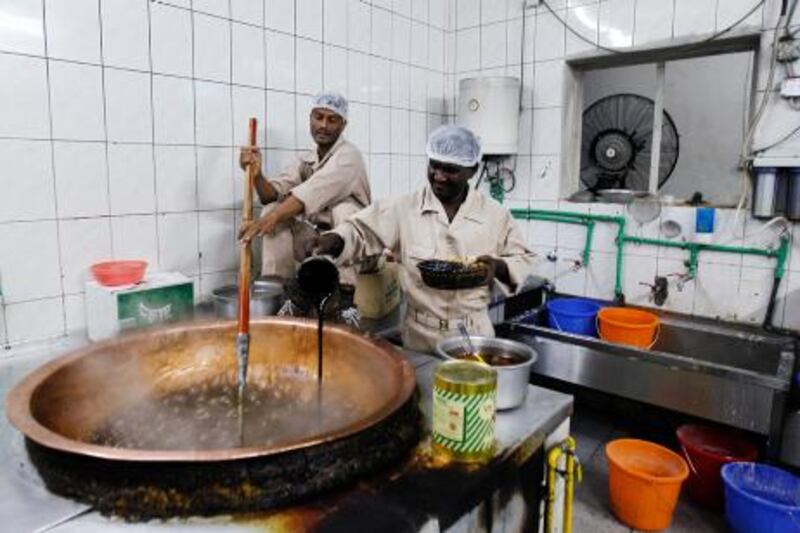AL AIN // "Have a taste of our sweetness. Here, have a taste."
Khamis Saeed drops his voice to a conspiratorial tone.
He is holding a tiny spoon of brown gelatinous goop called Omani halwa. It tastes of cardamom, saffron and roses.
"I'll give you a tip," Khamis says. "If you taste something, if you taste anything, put it in the back of your teeth and don't swallow it. Enjoy it."
He stands behind the counter at the Zahran Al Harasi halwa shop, a cardamom-scented haven amidst the stink and din of merchants haggling over dried shark at the Al Ain fish market.
The shop is owned by his close friend Zahran, a third-generation halwa maker whose name, in defiance of his bulk, means flower.
"Most people who try the business fail because they are taking it from the middle," says Zahran, speaking in Swahili through a translator. "They don't know the history, they don't know the quality of it, it's like they jump into it halfway."
Zahran suspects his halwa lineage dates back centuries but it was his grandfather Homaid who made halwa an international business when he set off on a dhow for Zanzibar with the family recipe.
At that time, the island of Zanzibar had recently emerged from the Omani Sultanate and was a key Indian Ocean port for Gulf sailors.
Sailors who, Homaid reasoned, would be wealthy from trade and hungry for sweets from home.
Homaid, from the interior mountain village of Rustaq, saw the potential.
His grandchildren credit him with popularising halwa on the island.
Homaid sailed between Zanzibar and Oman for decades. On his final journey home to retire, his ship was caught in a storm. Homaid was lost at sea.
His son Mohammed turned the business north and opened the first halwa store at the Al Ain fish market in 1979.
The Omani treat is now an indispensable part of souq sales and the Emirati palate.
"Emiratis and Omanis they are all family in these things," says Zahran. (story continues below)
FROM THE BLOGS
[ Photo special: Hard work and long hours for the sweet smell of halwa at Eid, by Sarah Dea ]
The labour-intensive brew is reserved for weddings and Eid. Before oil wealth, halwa was a privilege of the rich: children lucky enough to eat it would not wash their hands so that they could boast to their friends of sticky fingers.
Today, Zahran sells an average of 160 kilogrammes a week in Al Ain. During Eid, sales quadruple.
"You won't even come inside the door," says Khamis. "All these shelves are full of orders. Where you sit, full of orders."
For Eid, Zahran doubles his staff and lights an additional four copper cauldrons.
The sweet tells the story of old trade routes: Indian cardamom, Iranian saffron, Zanzibari nuts and rose water distilled from the red and white roses of Oman's Jebel Akhdar mountain south of Al Ain. Spices are boiled and stirred with water, ghee and starch in a heated 50-kg cooper vat for two hours.
"This is inherited from the time of pharaoh in Egypt," says Khamis. "The Omanis, they used to penetrate many countries for trade, so they went to Egypt, they went to Africa, they took things from different countries, they took the halwa from the pharaoh's time and brought it to Oman and kept it as snacks."
The sweet is now synonymous with Oman but can be found across the Arabian Peninsula and as far away as the Balkans.
Zahran was 15 when he joined his father; now he runs eight shops in the UAE and Oman with his brothers.
He was told that his grandfather Homaid was as generous and as sweet as the halwa he sold.
His father, Mohammed, a man with a flowing white beard and thick black eyebrows, was equally generous but could suspend his calm demeanour for his craft.
Mohammed would scoop the hot halwa onto his finger each time he entered the shop and shout his dissatisfaction if it was not up to scratch.
These days, every Al Ain batch is tested by Saleem Rashed. A man of great muscles from Zanzibar, Saleem was so famous on the island as a halwa maker that he was recruited by Zahran's father.
"We need muscular people," says Khamis. "It's very hard work."
The shop sells more than 10 flavours, including saffron, apricot, date syrup, olive, ginger and milk.
Zahran served the former US president George W Bush his grandfather's original recipe, Sultaniya.
He is waiting for current US president Barack Obama. The shop is patronised by family friends "who from their fathers' time until now are coming to buy things from us".
For Zahran, that is sweeter than halwa.






